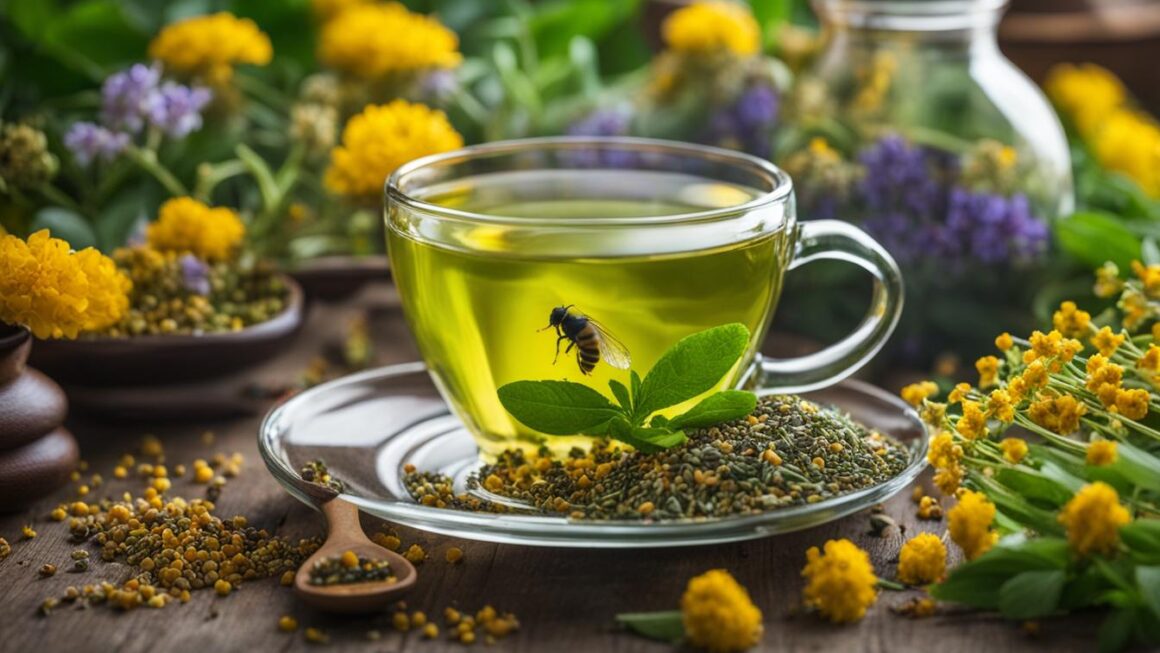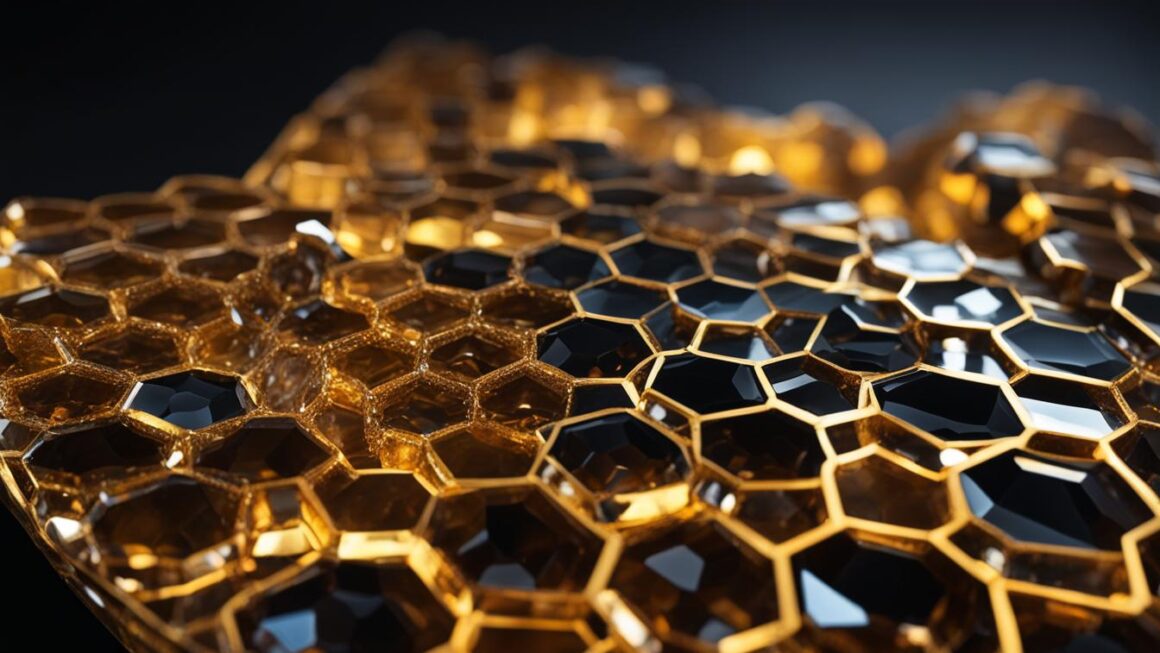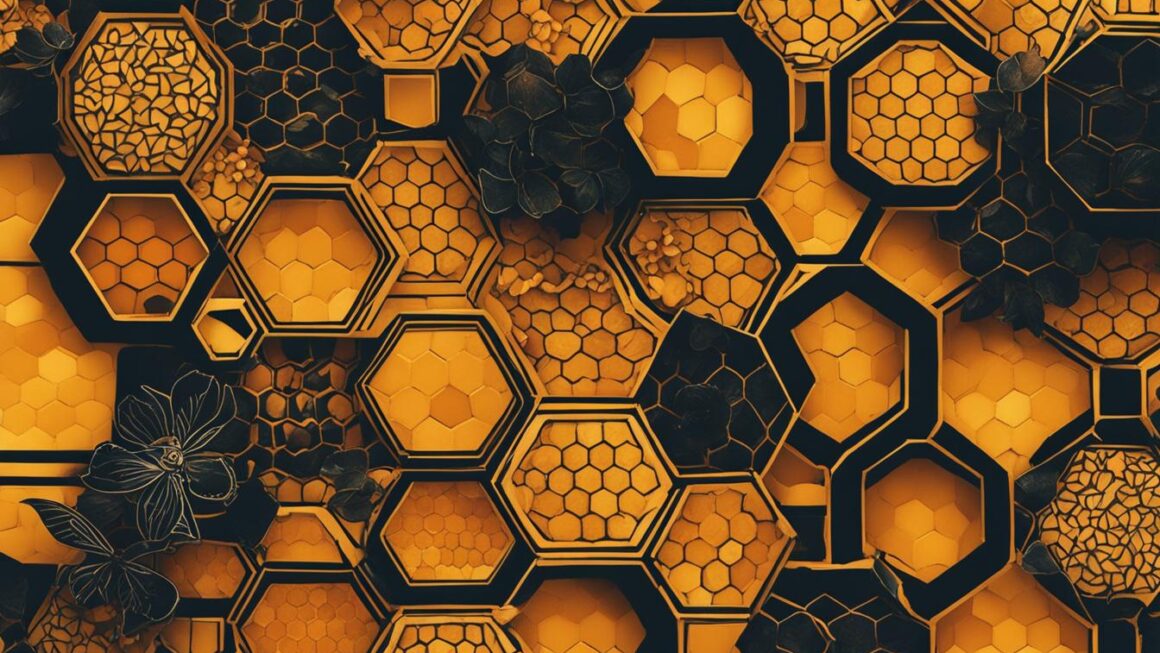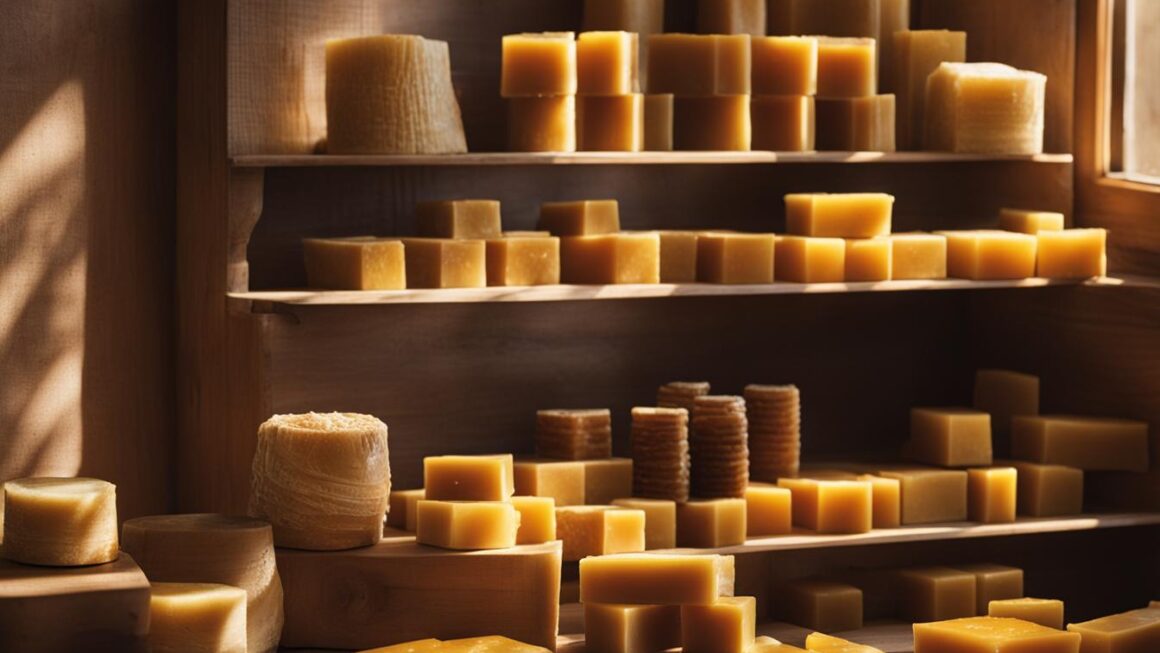Bee pollen is a little-known and unused sweetener additive that can provide numerous health benefits. It is made by honeybees as a food source for young bees and is packed with essential nutrients. While the medical community has not confirmed all the health benefits, many individuals believe bee pollen to be “nature’s perfect food.” However, it’s important to consult with your doctor and be aware of potential allergies or side effects before incorporating bee pollen into your tea.
Key Takeaways:
- Adding bee pollen to your tea can provide various health benefits.
- Consult with your doctor before incorporating bee pollen into your diet, especially if you have allergies or medical conditions.
- Choose high-quality, organic bee pollen from reputable sources.
- Experiment with different recipes and methods to incorporate bee pollen into your tea.
- Be mindful of potential allergies and start with small amounts to assess your tolerance.
The Nutritional Benefits of Bee Pollen
When it comes to nutrition, bee pollen is a true superfood. Packed with essential vitamins, minerals, amino acids, and antioxidants, it offers a wide range of health benefits. Bee pollen is known to support immune function, increase energy levels, and improve digestion, making it a valuable addition to your diet.
One of the key nutritional benefits of bee pollen is its rich vitamin content. It contains vitamins A, B complex, C, D, and E, all of which play important roles in maintaining overall health. These vitamins contribute to strong immunity, healthy skin, and improved cognitive function.
Additionally, bee pollen is a valuable source of minerals such as calcium, magnesium, and iron. These minerals are essential for maintaining strong bones, supporting muscle function, and promoting healthy blood cells. Bee pollen also contains a variety of amino acids, the building blocks of protein, which are necessary for muscle repair, tissue growth, and overall cellular function.
| Nutrient | Amount per 100g of Bee Pollen |
|---|---|
| Protein | 22g |
| Carbohydrates | 45g |
| Fat | 3g |
| Vitamin A | 5200 IU |
| Vitamin C | 15mg |
| Calcium | 90mg |
Another noteworthy aspect of bee pollen is its potent antioxidant content. Antioxidants help protect the body against oxidative stress and damage caused by free radicals. By incorporating bee pollen into your diet, you can support cellular health and reduce the risk of chronic diseases, such as heart disease and cancer.
Bee pollen is a true nutrient powerhouse, offering a wide range of vitamins, minerals, amino acids, and antioxidants. It supports immune function, increases energy levels, and promotes overall well-being. Incorporating bee pollen into your diet can provide numerous health benefits and is an easy way to enhance your nutrition.
However, it’s important to note that while bee pollen has many potential health benefits, it may not be suitable for everyone. Some individuals may have allergies to bee pollen and may experience adverse reactions. It’s always best to consult with a healthcare professional before incorporating bee pollen into your diet, especially if you have known allergies or health conditions.
How to Choose High-Quality Bee Pollen
When it comes to incorporating bee pollen into your tea, selecting high-quality pollen is essential to ensure you’re reaping its full benefits. Here are some tips to help you choose the best bee pollen:
- Source: Look for bee pollen that is organically sourced. Be sure to check if the pollen comes from reliable producers who prioritize sustainable and ethical practices.
- Purity: Opt for bee pollen that is free from additives, chemicals, and contaminants. Make sure the product has undergone rigorous testing and is certified to meet strict quality standards.
- Local or Trusted Brands: Consider buying bee pollen from local beekeepers or trusted brands with a good reputation. These sources often prioritize freshness and offer pollen harvested from bees in your region, which may offer additional health benefits.
- Storage: Proper storage is crucial to maintain the freshness and potency of bee pollen. Store it in a cool, dry place away from direct sunlight and moisture.
By following these guidelines, you can be confident in selecting high-quality bee pollen for your tea.
Bee Pollen Tea Recipes to Try
Adding bee pollen to your tea can not only enhance the flavor but also provide additional nutritional benefits. Here are a few simple and delicious bee pollen tea recipes to try:
1. Honey Bee Bliss Tea
| Ingredients | Instructions |
|---|---|
| 1 teaspoon bee pollen | 1. Brew a cup of your favorite herbal tea. |
| 1 tablespoon honey | 2. Add the bee pollen and honey to the tea. |
| 1 squeeze of lemon juice | 3. Stir well and enjoy the soothing and nourishing benefits of the honey bee bliss tea. |
2. Berrylicious Bee Pollen Tea
| Ingredients | Instructions |
|---|---|
| 1 teaspoon bee pollen | 1. Steep a berry-flavored tea bag in a cup of hot water. |
| Handful of mixed berries (strawberries, blueberries, raspberries) | 2. Remove the tea bag and add the bee pollen and mixed berries to the tea. |
| 1 teaspoon honey (optional) | 3. Stir well and let the flavors infuse for a few minutes. You can add honey for added sweetness if desired. |
3. Tropical Paradise Tea
| Ingredients | Instructions |
|---|---|
| 1 teaspoon bee pollen | 1. Brew a cup of tropical fruit-infused tea. |
| Splash of coconut milk | 2. Add the bee pollen and a splash of coconut milk to the tea. |
| Squeeze of lime juice | 3. Stir well and imagine yourself sipping this refreshing tropical paradise tea on a sunny beach. |
Feel free to experiment with different types of teas, fruits, and flavors to create your own customized bee pollen tea recipes. Remember to start with small amounts of bee pollen and gradually increase as per your taste preferences.
Tips for Incorporating Bee Pollen into Your Tea
Using bee pollen in tea can be a great way to add flavor and potential health benefits to your daily beverage. Here are some tips to help you make the most of incorporating bee pollen into your tea:
1. Start with small amounts
When using bee pollen for the first time, it’s best to start with small amounts to assess your tolerance. Begin by adding a pinch of bee pollen to your tea and gradually increase the amount based on your preferences.
2. Mix it well
To ensure that the bee pollen is evenly distributed in your tea, mix it well before drinking. Stir your tea thoroughly, or use a whisk or frother to blend the bee pollen into the liquid completely. This will help to enhance the flavor and maximize the benefits.
3. Experiment with different flavors
Bee pollen pairs well with a variety of tea flavors, so don’t be afraid to experiment and find your favorites. Whether you prefer herbal, green, black, or floral teas, bee pollen can complement the taste and add a unique twist. Consider trying different combinations to discover the perfect flavor profile for your palate.
By following these tips, you can enhance your tea-drinking experience and maximize the benefits of bee pollen. Remember to start slowly, mix well, and have fun exploring the various flavors that bee pollen can bring to your favorite tea.
Addressing Concerns about Heat and Bee Pollen
One common concern among tea enthusiasts is whether the heat from boiling water can diminish the beneficial properties of bee pollen. It’s essential to understand the impact of temperature on bee pollen and how to preserve its nutritional value when preparing tea.
According to experts, the beneficial enzymes and nutrients in bee pollen are generally not significantly affected by hot water that has just been boiled. However, to ensure maximum nutrient retention, it is recommended to wait a few minutes for the water to cool slightly before adding bee pollen to your tea. This way, you can still enjoy the potential health benefits without compromising the quality of the bee pollen.
“The healing benefits of bee pollen can still be obtained when added to hot water, as long as it’s not boiling. Allowing the water to cool slightly helps preserve the nutritional content,” advises Dr. Sarah Thompson, a renowned nutritionist.
To illustrate the effect of water temperature on bee pollen, a study conducted by the Bee Research Laboratory compared the nutrient composition of bee pollen exposed to various temperatures. The table below highlights the results:
| Temperature | Nutrient Content (Before/After) |
|---|---|
| Room Temperature | No significant change |
| 60°C (140°F) | Slight decrease in certain enzymes |
| 100°C (212°F) | Minimal loss of nutrients |
Based on the study’s findings, it can be concluded that while bee pollen may experience a slight reduction in enzymes and nutrients at higher temperatures, the impact is minimal. Therefore, by allowing the water to cool slightly, you can still enjoy the full potential of bee pollen in your tea.
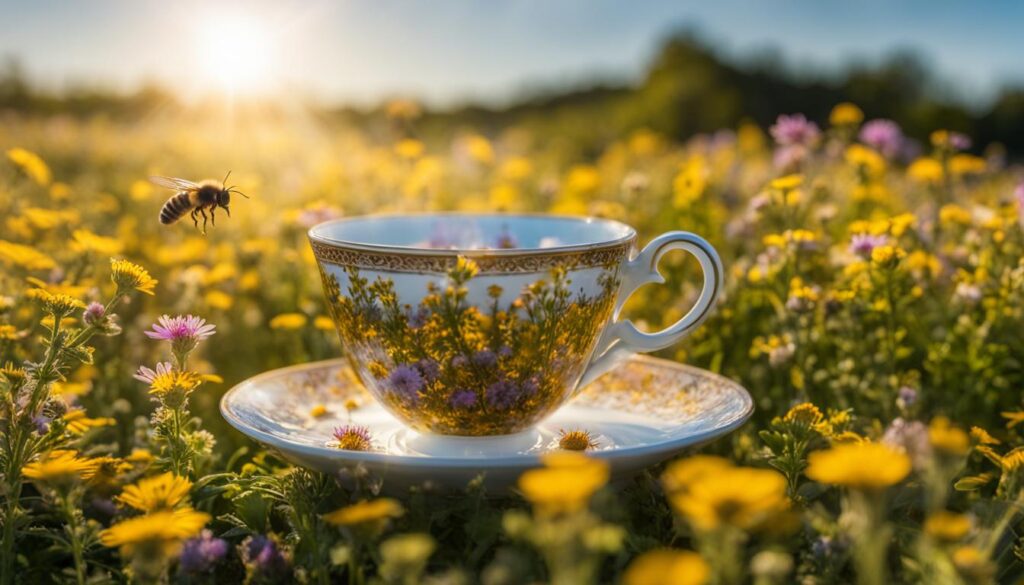
The Convenience of Bee Pollen-Infused Tea
For those who are hesitant about adding bee pollen directly into their tea, there are convenient options available. Some brands offer pre-packaged tea blends that already contain a low level of bee pollen, making it easy to enjoy the benefits without additional preparation. These blends are typically certified organic and may also include other complementary ingredients for added flavor and wellness benefits.
Pre-packaged bee pollen tea blends provide a hassle-free way to incorporate bee pollen into your tea routine. They save you time and effort, especially if you’re always on the go or have a busy lifestyle. Simply steep the tea bag in hot water, and you’ll be able to savor the unique taste and potential health benefits of bee pollen.
If you prefer a more customized tea experience, you can also create your own blend by mixing bee pollen with your favorite loose leaf tea. This allows you to control the amount of bee pollen you’re adding and tailor the flavors to your liking. Experiment with different combinations to find the perfect balance that suits your taste preferences.
Benefits of Pre-Packaged Bee Pollen Tea Blends:
- Convenient and time-saving
- Certified organic and high-quality
- May include other beneficial ingredients
- No additional preparation required
- Ease of use for individuals with busy lifestyles
| Bee Pollen Tea Brand | Ingredients | Benefits |
|---|---|---|
| Brand A | Organic tea leaves, bee pollen, chamomile | Immune support, relaxation |
| Brand B | Green tea, bee pollen, lemon verbena, mint | Antioxidant boost, digestion aid |
| Brand C | Black tea, bee pollen, cinnamon, ginger | Energy boost, digestive health |
“I love the convenience of pre-packaged bee pollen tea blends. They allow me to enjoy the benefits of bee pollen without the hassle of measuring or preparing it myself. Plus, the added ingredients in the blends enhance the flavors and offer additional health benefits.” – Jane, avid tea enthusiast
Bee Pollen Beyond Tea
Bee pollen is not limited to being used solely in tea; it can also be incorporated into a wide range of culinary applications. Adding bee pollen to various food dishes can elevate flavors and provide an extra nutritional boost. Here are a few ideas for utilizing bee pollen in your cooking:
1. Smoothies
Add a teaspoon of bee pollen to your favorite smoothie recipe for an added burst of antioxidants, vitamins, and minerals. The subtle floral notes of bee pollen can complement the flavors of fruits and vegetables, enhancing the overall taste and nutritional value of your smoothie.
2. Baked Goods
Sprinkle bee pollen over baked goods such as muffins, cookies, or granola bars to introduce a unique and nutritious element. The vibrant colors and crunchy texture of bee pollen can add visual appeal and a delightful flavor to your favorite treats.
3. Salad Dressings
Create a homemade salad dressing by combining olive oil, lemon juice, honey, and a pinch of bee pollen. The bee pollen will add a subtle sweetness and complexity to the dressing, making your salads even more enjoyable and nutritious.
Remember to start with small amounts of bee pollen when experimenting with different culinary applications. Excessive heat can diminish the nutritional properties of bee pollen, so it’s best to incorporate it into dishes that don’t require high-temperature cooking. Get creative in the kitchen and explore how bee pollen can enhance your favorite recipes!
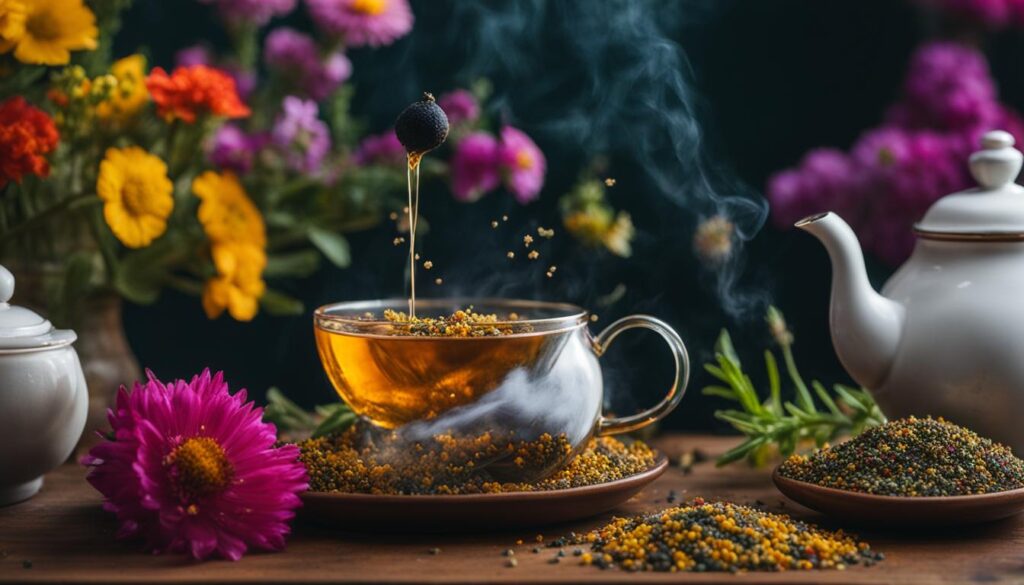
Safety Precautions and Allergies
Bee pollen offers numerous potential health benefits, but it’s essential to be mindful of safety precautions and potential allergies. While many individuals tolerate bee pollen well, some may experience allergic reactions. Common symptoms include itching, swelling, and difficulty breathing. If you have a known allergy to pollen or bee stings, it’s best to avoid bee pollen altogether.
Consulting with a healthcare professional is recommended, especially if you’re unsure about your tolerance or potential allergies. They can provide personalized guidance and help determine if incorporating bee pollen into your tea or diet is safe for you.
It’s important to note that bee pollen should not be used as a replacement for medical treatment or professional advice. If you have underlying health conditions or are taking medications, it’s crucial to consult with your healthcare provider before adding bee pollen to your tea.
Table: Potential Side Effects of Bee Pollen
| Side Effects | Description |
|---|---|
| Allergic Reactions | Itching, swelling, difficulty breathing |
| Digestive Issues | Upset stomach, diarrhea, bloating |
| Hormonal Effects | Possible impact on estrogen levels |
| Drug Interactions | Possible interactions with certain medications |
Remember, bee pollen is a potent substance, and even though it offers potential health benefits, it may not be suitable for everyone. Prioritize your safety and well-being by educating yourself on potential risks and seeking professional advice when necessary.
The Wonder of Bee Pollen in Tea
Incorporating bee pollen into your tea can be a delightful and flavorful addition that also provides potential health benefits. Bee pollen is known to be packed with essential nutrients, making it a valuable ingredient to enhance your tea experience. By adding bee pollen to your tea, you can enjoy a unique taste and texture while maximizing the potential benefits.
One of the key benefits of bee pollen in tea is its ability to boost the nutritional value of your beverage. Bee pollen is rich in vitamins, minerals, amino acids, and antioxidants that can support immune function, increase energy levels, and improve digestion. It is also believed to have positive effects on allergies, skin health, and weight management. By incorporating bee pollen into your tea, you can make your daily ritual even more beneficial for your overall well-being.
To enhance your tea with bee pollen, you can try different recipes and methods. One simple way is to add a teaspoon of bee pollen directly into your tea and stir until it dissolves. You can also infuse bee pollen by steeping it in hot water, similar to brewing loose leaf tea. This method allows the flavors and nutrients of bee pollen to be released gradually, resulting in a more nuanced and enjoyable tea experience. Remember to consult with a healthcare professional if you have any concerns or allergies before incorporating bee pollen into your tea routine.
In summary, incorporating bee pollen into your tea can be a wonderful way to elevate your tea ritual both in taste and potential health benefits. Explore different recipes, experiment with infusing methods, and enjoy the wonders of bee pollen-infused tea. Cheers to a flavorful and wellness-boosting tea experience!
Benefits of Bee Pollen in Tea:
- Boosts nutritional value of tea with vitamins, minerals, and antioxidants
- Supports immune function and increases energy levels
- Improves digestion and promotes overall well-being
- Potential positive effects on allergies, skin health, and weight management
Conclusion
Bee pollen offers a range of potential health benefits and can be easily incorporated into your tea routine. Whether you prefer simple recipes, pre-packaged blends, or exploring culinary applications, there are plenty of options to enjoy the wonders of bee pollen in tea.
However, it’s important to consider safety precautions before incorporating bee pollen into your tea. Consulting with a healthcare professional can provide personalized advice and ensure that bee pollen is suitable for you. Additionally, it’s recommended to start with small amounts to assess your tolerance and avoid any potential allergic reactions.
Cheers to a healthier and more flavorful tea experience with bee pollen!
FAQ
What are the potential health benefits of adding bee pollen to tea?
Bee pollen is believed to support immune function, increase energy levels, improve digestion, and promote overall well-being. It may also help with allergies, skin health, and weight management. However, it’s important to consult with a healthcare professional for personalized advice.
How can I choose high-quality bee pollen for my tea?
Look for bee pollen that is organically sourced, free from additives or chemicals, and purchased from reputable sources such as local beekeepers or trusted brands. Store the bee pollen in a cool, dry place to maintain freshness and potency.
What are some simple bee pollen tea recipes to try?
Here are a few ideas:
– Add a teaspoon of bee pollen to your favorite herbal tea for a nutritious boost.
– Mix bee pollen with honey and lemon for a refreshing and immune-boosting tea.
– Combine bee pollen with green tea and a hint of mint for a revitalizing beverage.
Do I need to be cautious about the heat when using bee pollen in tea?
Hot water that has just been boiled will not significantly reduce the healing benefits of bee pollen. However, to preserve the maximum nutrient content, it is recommended to wait until the water cools slightly before adding bee pollen to your tea.
Are there convenient options for bee pollen tea?
Yes, some brands offer pre-packaged tea blends that already contain a low level of bee pollen. These blends allow you to experience the benefits of bee pollen without the need for additional preparation. Look for certified organic blends that combine bee pollen with other complementary ingredients.
Can bee pollen be used in other culinary applications besides tea?
Absolutely! You can sprinkle bee pollen over tea pastries, add it to smoothies, homemade energy bars, or salad dressings for added flavor and nutrition. However, be cautious of using bee pollen in high-temperature cooking, as excessive heat may impact its nutritional properties.
Are there any safety precautions or potential allergies related to bee pollen?
Some individuals may be allergic to bee pollen and may experience allergic reactions such as itching, swelling, or difficulty breathing. If you have a known allergy to pollen or bee stings, it’s best to avoid bee pollen altogether. It’s recommended to consult with a healthcare professional before incorporating bee pollen into your tea or diet.

